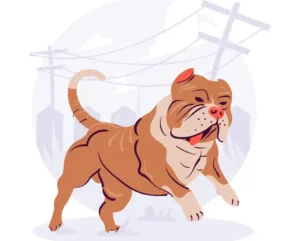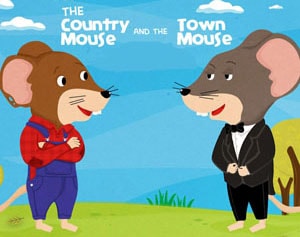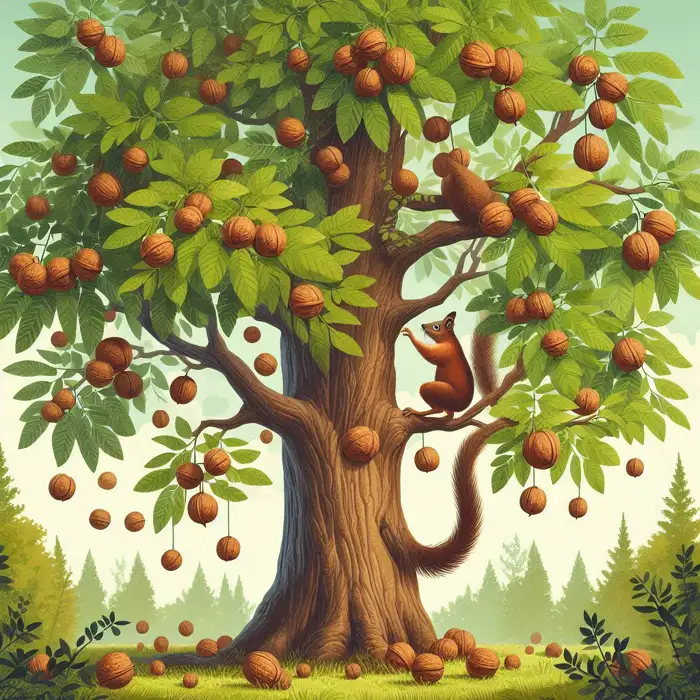The Town Mouse and the Country Mouse
The Town Mouse and the Country Mouse
Available in the public domain at: https://www.gutenberg.org/
Now you must know that a Town Mouse once upon a time went on a visit to his cousin in the country. He was rough and ready, this cousin, but he loved his town friend and made him heartily welcome. Beans and bacon, cheese and bread, were all he had to offer, but he offered them freely.
The Town Mouse rather turned up his long nose at this country fare, and said: “I cannot understand, Cousin, how you can put up with such poor food as this, but of course you cannot expect anything better in the country; come you with me and I will show you how to live. When you have been in town a week you will wonder how you could ever have stood a country life.” No sooner said than done: the two mice set off for the town and arrived at the Town Mouse’s residence late at night.

“You will want some refreshment after our long journey,” said the polite Town Mouse, and took his friend into the grand dining-room. There they found the remains of a fine feast, and soon the two mice were eating up jellies and cakes and all that was nice. Suddenly they heard growling and barking.

“What is that?” said the Country Mouse. “It is only the dogs of the house,” answered the other. “Only!” said the Country Mouse. “I do not like that music at my dinner.” Just at that moment the door flew open, in came two huge mastiffs, and the two mice had to scamper down and run off. “Good-bye, Cousin,” said the Country Mouse, “What! going so soon?” said the other. “Yes,” he replied;
“Better beans and bacon in peace than cakes and ale in fear.”
New words and expressions
- heartily: wholeheartedly, sincerely
- Turned up his long nose at: showed reluctance to
- Fare: food, menu, meal
- Put up with: tolerate, bear, withstand
- In the country: land outside towns and cities
- Set off for the town: started to take a trip to the town
- Residence: home, house, dwelling, abode
- Refreshment: drinks and food
- Feast: a large and elaborate meal
- Mastiff: a large and aggressive dog
- scamper: scurry, dash
- Ale: an alcoholic drink
Questions for discussion
1. The Town Mouse convinces the Country Mouse to visit the city. What are some of the luxurious foods the Town Mouse offers?
2. While enjoying the fancy feast, what danger disrupts the Town Mouse and Country Mouse?
3. After the scare, the Country Mouse decides to return home. What does this tell you about the Country Mouse’s priorities?




the barking of the mastiffs – rozita
The source of danger was coming from the huge mastiffs and the dogs of the house.
1. The mouse offers jelly and cake as a Luxurious food -Robina
The town mouse offers his cousin luxurious foods, such as jellies and cakes in the feast.
1. The two mice found a fine feast of jellies and cakes.
2. The two huge mastiffs come in and barking while the two mice enjoying the fancy feast.
3. As the Country Mouse did, peace was more important than the fine feasts. This story telling us, fear and anxiety do not let us to enjoy luxurious life.
Thank you so much for your comment!
Feedback
1. The two huge mastiffs came in and started barking while the two mice were enjoying the fancy feast.
2. As the Country Mouse did = Did you mean “said” instead of “did”? – As the country mouse said
3. This story telling us = This story tells us
4. fear and anxiety do not let us to enjoy luxurious life. = do not let us enjoy (causative verbs) …
And also in this sentence: ( in came two huge mastiffs.), shouldn’t it be ( came in) ?
You’re right. This is because of the old-fashioned and literary style of this fable. In addition, sometimes we change the order of words to place some emphasis. For example, we say: “Study more carefully for the exam” said the teacher. However, we should say: the teacher said.
Hello Dr.Hariri. I have a question.
What is the meaning of this sentence: (No sooner said than done.)
Hi Armaghan.
No sooner said than done = immediately
It means the act of saying and doing something happens at the same time without wasting any time.